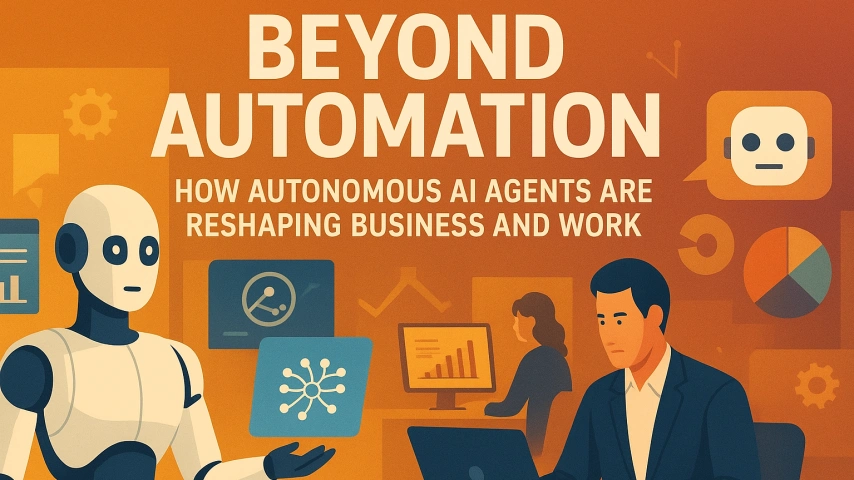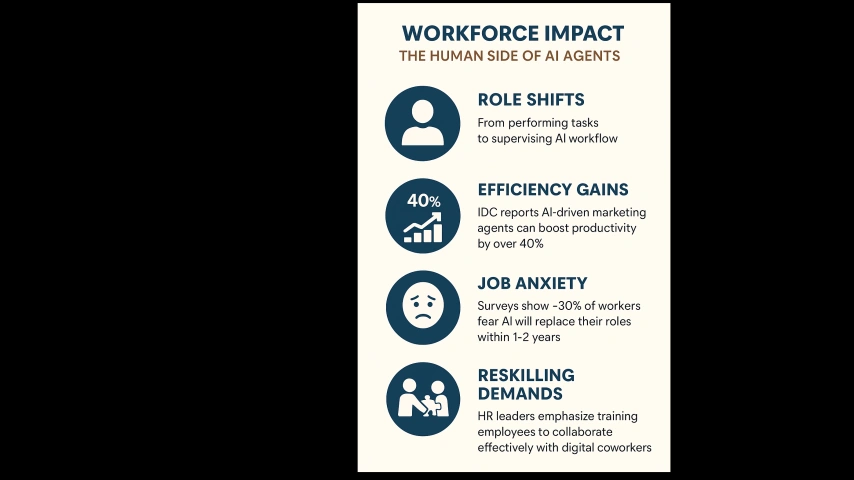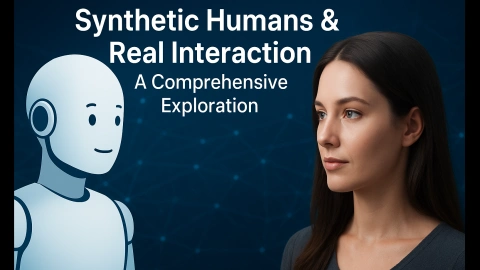AI / Detail
Beyond Automation: How Autonomous AI Agents Are Reshaping Business and Work
Michael Jack | 19 August 2025 | 12:00
Autonomous AI agents are no longer just a futuristic concept—they are emerging as real drivers of business transformation.
Market research from McKinsey, Gartner, and IDC shows a clear trajectory: within the next 12 months, adoption of AI agents will accelerate across industries, influencing not just operational workflows, but also workforce structures, economic outcomes, and competitive strategies.
As organizations transition from experimentation to scaled deployment, the impact of autonomous agents will ripple far beyond efficiency gains, touching innovation, talent management, and long-term competitiveness.
Market Landscape and Adoption Trends
- Rapid Market Growth: According to Gartner, by 2026, over 40% of large enterprises are expected to deploy AI agents in at least one business domain. Current adoption is fastest in marketing automation, customer service, and supply chain management, but sectors like education, manufacturing, and healthcare are quickly catching up.
- Investment Surge: Venture capital investments in AI agents and autonomous systems surpassed $2 billion in 2024, with startups focusing on vertical solutions for finance, healthcare, and retail. Established tech players are also acquiring smaller AI-first companies to accelerate innovation pipelines.
- One-Year Outlook: In the next 12 months, early adopters will expand pilot programs into full-scale deployments, particularly in knowledge-heavy functions where cost savings can exceed 30–50%. We can expect companies to move from proof-of-concept to production-ready systems that are deeply integrated into enterprise workflows.
- Coca-Cola: Experimented with AI-driven marketing agents to generate creative campaigns and automate digital ads. Results included a 20% increase in engagement rates and reduced manual workload for creative teams. Beyond advertising, the company also explored real-time personalization of content and promotions, allowing regional teams to tailor experiences for local audiences, which enhanced customer loyalty metrics by an additional 15%. Coca-Cola now positions AI as a cornerstone in its brand storytelling and consumer engagement strategy.
- JPMorgan Chase: Introduced AI agents to handle routine compliance monitoring. This reduced review times by 50% and allowed analysts to focus on high-risk cases. The firm also began piloting AI-driven financial advisory tools, helping wealth managers quickly identify patterns in client portfolios, which contributed to faster decision-making and improved client satisfaction scores. Over time, these tools are expected to reduce financial risk exposure while expanding advisory capacity.
- Unilever: Leveraged AI agents for talent acquisition, with automated screening and candidate engagement, saving HR teams thousands of hours annually. In addition, Unilever applied AI agents to optimize supply chain logistics, predicting demand fluctuations and adjusting procurement strategies. This not only saved costs but also improved sustainability by reducing waste and overproduction. The company has highlighted AI adoption as part of its broader ESG goals.
Workforce Impact: The Human Side of AI Agents
The introduction of AI agents presents complex implications for workers:
- Role Shifts: Analysts, marketers, and support staff are transitioning from executing repetitive tasks to supervising and interpreting AI outputs. This shift is altering job descriptions, requiring a blend of technical and strategic thinking.
- Efficiency Gains: IDC estimates that AI-driven marketing agents can boost productivity by 40% or more, freeing workers for creative and strategic functions. Teams are increasingly acting as curators and orchestrators of machine-generated insights.
- Job Anxiety: Surveys show ~30% of employees fear AI may replace their jobs in the next 1–2 years, highlighting a pressing need for transparent communication and change management strategies.
- Reskilling Demands: HR leaders emphasize training for collaboration with digital coworkers. Skills in AI oversight, strategic decision-making, data literacy, and creative problem-solving will be prioritized. Universities and corporate learning platforms are already launching AI-focused curricula to fill this gap.

Cost Optimization: Automated workflows reduce dependency on outsourcing for repetitive tasks, cutting operational costs by 20–35%. Savings are being reinvested in R&D and customer experience initiatives, creating a reinforcing cycle of innovation.
Impact on Personal Income: While some repetitive roles face wage stagnation, professionals who adapt to AI collaboration (e.g., prompt engineers, AI supervisors, AI trainers) are seeing rising salaries, with LinkedIn reporting demand spikes of +120% year-over-year for these roles. The growing “AI economy” is generating entirely new career paths.
Long-Term View (12–18 Months)
Integration Over Replacement : AI agents will be embedded into existing platforms (Microsoft 365 Copilot, Salesforce Einstein, HubSpot AI), becoming standard business tools rather than standalone experiments.
Regulatory Oversight: Governments are beginning to explore frameworks for AI accountability, requiring companies to manage transparency, fairness, and auditability in AI-driven decisions. Early regulatory clarity may shape adoption speed across sectors.
Human-AI Synergy: The real winners will be companies that position AI agents as augmenters of human talent, not replacements. This hybrid approach will ensure both efficiency and innovation, while maintaining employee morale and creativity.
Cultural Shifts: Organizations will need to foster a mindset where AI is viewed as a partner. This cultural evolution is likely to be as critical as the technology itself in determining success.
Key Takeaway
Autonomous AI agents are not just reshaping processes—they are redefining what it means to work, earn, and innovate in the modern economy.
They are driving a profound shift in business models, workforce expectations, and even societal definitions of productivity. For businesses, the next year is not about experimenting with AI in isolated pilot projects;
it’s about fully embedding these systems into organizational culture, building the technical frameworks to support scale, and fostering the human adaptability required to thrive in this new environment.
Leaders will need to encourage cross-functional collaboration, invest in employee upskilling, and establish ethical guidelines to balance innovation with trust.
They must also communicate a clear vision to reduce employee anxiety and foster long-term alignment. Ultimately, the future belongs to organizations that embrace AI agents as long-term partners—creating ecosystems where human creativity and machine intelligence combine to unlock growth, resilience, and competitive advantage.
Related
-

Invisible Computing and the Rise of Smart Glasses: Market Dynamics, Strategies, and Challenges Ahead
AI22 August 2025
-

AI and Biotechnology Convergence: Shaping the Future of Precision Medicine
AI21 August 2025
-

Synthetic Humans and Real Interaction: A Comprehensive Exploration
AI20 August 2025
-

Best AI Tools for Stock Research in 2025: What’s Worth Using?
AI03 August 2025
-

Can AI Predict Market Crashes? What We Know (and Don’t)
AI03 August 2025
-

Subscription Fatigue? How to Choose SaaS That Delivers Real ROI
AI31 July 2025
Editor's Pick
-

-

Can AI Predict Market Crashes? What We Know (and Don’t)
03 August 2025 -

-

-
